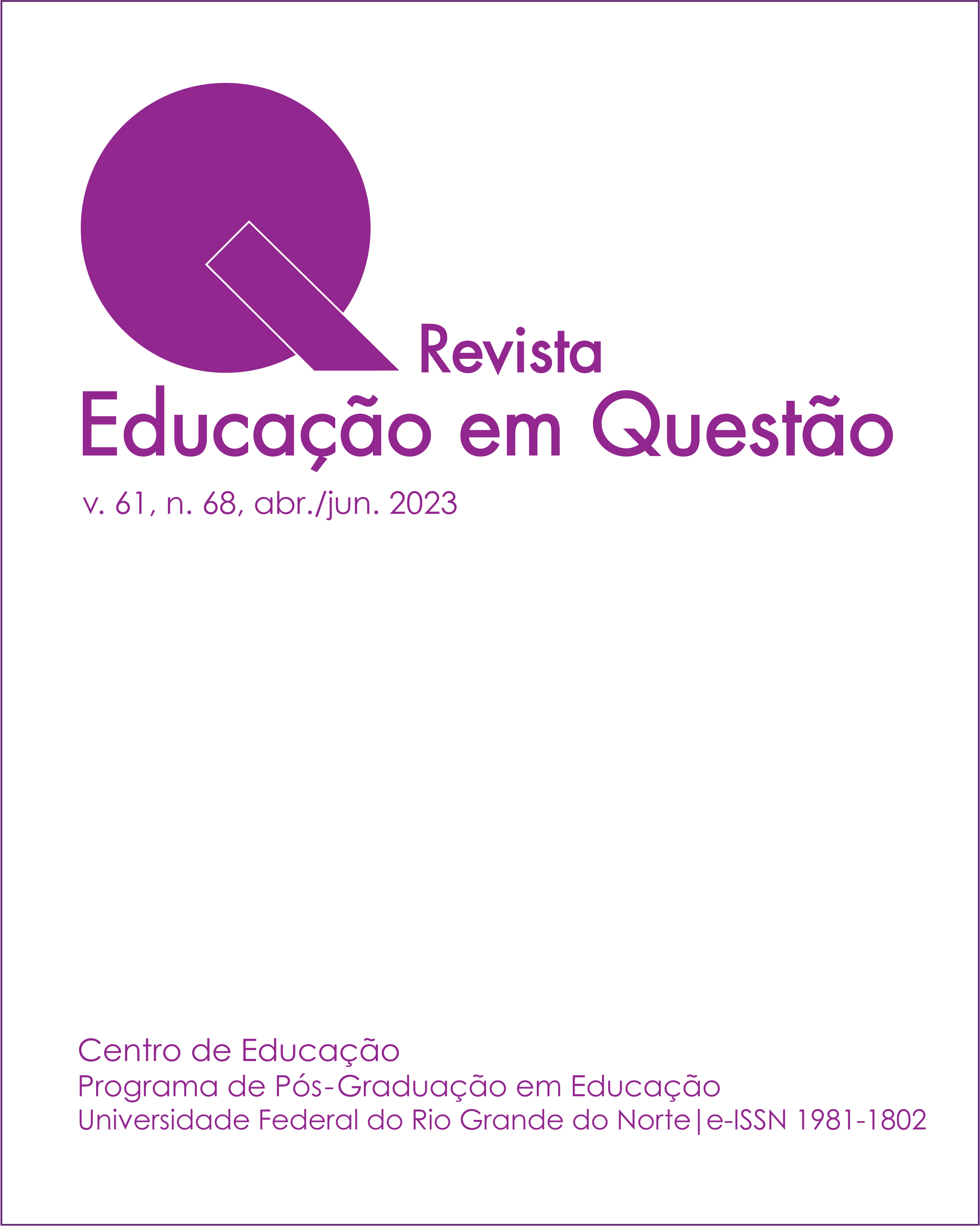Inquiry about the meanings of the educational phenomenon
DOI:
https://doi.org/10.21680/1981-1802.2023v61n68ID31811Keywords:
Hermeneutics, Education, Culture of boredom, Culture of meaningAbstract
Different perspectives approach education beyond the dominant instrumental rationality. One of them is dialogue between hermeneutics and education that produces alternative terms to think about the educational phenomenon. What meanings do we want for the educational phenomenon of our time? The objective is to reflect on the contributions of hermeneutics to education. We start from the understanding that hermeneutics allows to unveil the many veiled/crowded meanings present in education. That which is established in the field of school education and educational work requires being taken as a phenomenon to be repeatedly questioned and reflected upon. If today we live immersed in a culture of boredom, then hermeneutics can help us to think a culture of meaning for the educational phenomenon, a context in which the definition of minimum guidelines for the formation of cognitive and moral autonomy seems quite reasonable. This text is an essay that understands that this matrix of rationality has much to contribute to the understanding of the educational phenomenon of our time.
Downloads
References
ALMEIDA, Ana Cristina. Fenomenologia do sentir nas veredas da arte. In: PEIXOTO, Adão José (org.). Interações entre fenomenologia e educação. Campinas: Editora Alínea, 2003.
ARENHART, Livio et al. Metodologia e epistemologia: um olhar reflexivo e analítico sobre procedimentos de pesquisa. Cruz Alta: Ilustração, 2021.
ARENHART, Livio et al. A pesquisa na universidade: interconexões de abordagens teórico-metodológicas e interdisciplinares. Cruz Alta: Ilustração, 2022.
BOFF, Clodovis. Teologia e prática. Petrópolis: Vozes, 1978.
BRAYNER, Flávio. Educação e republicanismo: experimentos arendtianos para uma educação melhor. Brasília: Liber Livros, 2008.
BUENO, Enilda Rodrigues de Almeida. Fenomenologia: a volta às coisas mesmas. In: PEIXOTO, Adão José (org.). Interações entre fenomenologia e educação. Campinas: Alínea, 2003.
CORTELLA, Mario Sergio. Educação, convivência e ética: audácia e esperança! São Paulo: Cortez, 2015.
CHARLOT, Bernard. A mistificação pedagógica: realidades sociais e processos ideológicos na teoria da educação. São Paulo: Cortez, 2013.
DARDOT, Pierre; LAVAL, Christian. A nova razão do mundo: ensaio sobre a sociedade neoliberal. São Paulo: Boitempo, 2016.
FÁVERO, Altair Alberto. Violência da positividade e educação: da cultura do tédio à promoção da cultura do sentido. Roteiro, Joaçaba, v. 43, n. 2, p. 411-432, maio/ago. 2018.
FLICKINGER, Hans-Georg. A caminho de uma pedagogia hermenêutica. São Paulo: Autores Associados, 2010.
FREIRE, Paulo. Extensão ou comunicação. São Paulo: Paz e Terra, 1992.
GADAMER, Hans-Georg. Verdade e método. Petrópolis: Vozes, 1997.
HAN, Byung-Chul. Topología de la violencia. Barcelona: Herder, 2016.
HEIDEGGER, Martin. Que é isto – A filosofia? Identidade e diferença. Rio de Janeiro: Vozes, 2006.
HEIDEGGER, Martin. Ser e tempo.15. ed. Rio de Janeiro: Vozes, 2005a (Parte I).
HEIDEGGER, Martin. Ser e tempo. 13. ed. Rio de Janeiro: Vozes, 2005b (Parte II).
HERMANN, Nadja. Hermenêutica e educação. Rio de Janeiro: DP&A, 2002.
LAWN, Chris. Compreender Gadamer. 2. ed. Petrópolis: Editora Vozes, 2010.
LA TAILLE, Yves de. Formação ética: do tédio ao respeito de si. Porto Alegre: Artmed, 2009.
MARQUES, Mário Osorio. Conhecimento e modernidade em reconstrução. Ijuí: EditoraUnijuí, 1993.
MARQUES, Mário Osorio. Educação e conhecimento. Revista Contexto e Educação. Ijuí, v. 4, n.14, p. 17-33, abr./jun. 1989.
MARQUES, Mário Osorio. O educador/pedagogo na relação educativa direta. Revista Contexto e Educação, Ijuí, v. 5, n. 17, p. 17-30, jan./mar. 1990.
MARQUES, Mário Osorio. Aprendizagem na mediação social do aprendido e da docência. Ijuí: Editora Unijuí, 1995.
RORTY, Richard. Educação como socialização e como individualização. In: GHIRALDELLI JUNIOR, Paulo. Filosofia da educação. Rio de Janeiro: DP&A, 2000.
RORTY, Richard. Objetividad, relativismo y verdade. Barcelona: Paidos, 1996.
GAMBOA, Silvio Sánchez. Pesquisa em educação: métodos e epistemologias. Chapecó: Argos, 2007.
STEIN, Ernildo. Crítica da ideologia e racionalidade. Porto Alegre: Movimento, 1986.
STEIN, Ernildo. Pensar e errar: um ajuste com Heidegger. Ijuí: Editora Unijuí, 2011.
STEIN, Ernildo. Aspectos filosóficos e sócio-antropológicos do construtivismo pós-piagetiano II. In: GROSSI, Esther Pillar; BORDIN, Jussara (org.). Construtivismo pós-piagetiano. Petrópolis: Vozes, 1993.
STEIN, Ernildo. Órfãos de utopia: a melancolia da esquerda. 2. ed. Porto Alegre: Editora da Universidade, 1996.
TAYLOR, Charles. As fontes do self: a construção da identidade moderna. São Paulo: Edições Loyola, 1997.
TEIXEIRA, Evilázio. Aventura pós-moderna e suas sombras. São Paulo: Paulus, 2005.
TUGENDHAT, Ernst. Antropologia como filosofia primeira. In: POMMER, Arnildo; FRAGA, Paulo; SCHNEIDER, Paulo Rudi (org.). Filosofia e crítica: festschrift dos 50 anos do Curso de Filosofia da Unijuí. Ijuí: Editora Unijuí, 2007.
TUGENDHAT, Ernst. A questão do ser e seu fundamento linguístico. Ekstasis: revista de fenomenologia e hermenêutica, v.2, n. 2, p. 183-200, 2013.
WADDINGTON, Claudius. Tradição, conhecimento e interpretação. Revista Tempo Brasileiro, Rio de Janeiro, n. 148, p.169-185, jan./mar. 2002.
YOUNG, MICHAEL. Para que servem as escolas? Educação e Sociedade. Campinas, v. 28, n. 101, p. 1287-1302, set./dez. 2007.
Downloads
Published
How to Cite
Issue
Section
License
Copyright (c) 2023 Journal Education in Question

This work is licensed under a Creative Commons Attribution-NonCommercial-ShareAlike 4.0 International License.
The Journal Education in Question shall retain the copyright in all articles that it publishes.
The authors and co-authors of articles and book reviews, published in the Journal Education in Question, shall wait for at least 1 (one) year before they are allowed to submit new works for publication.






